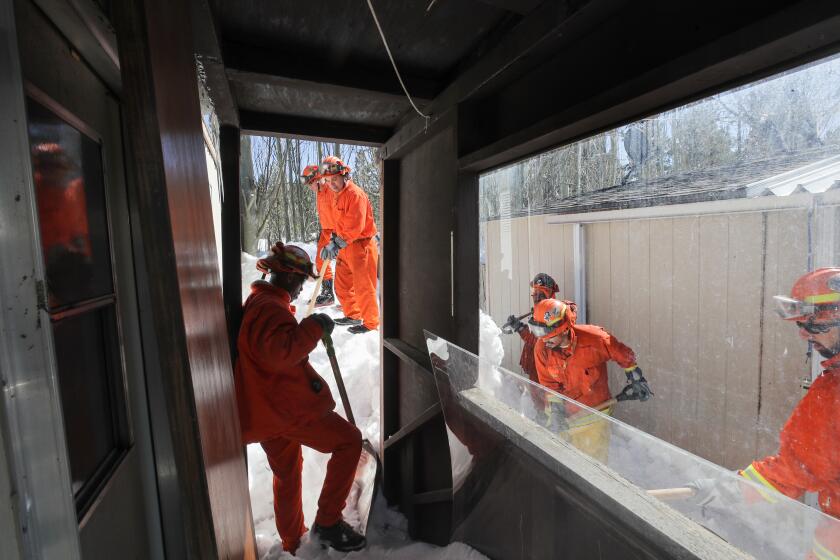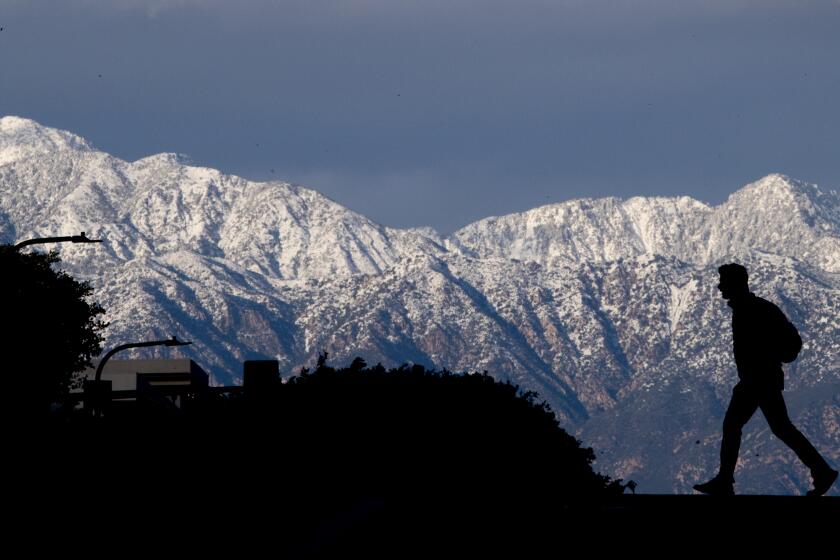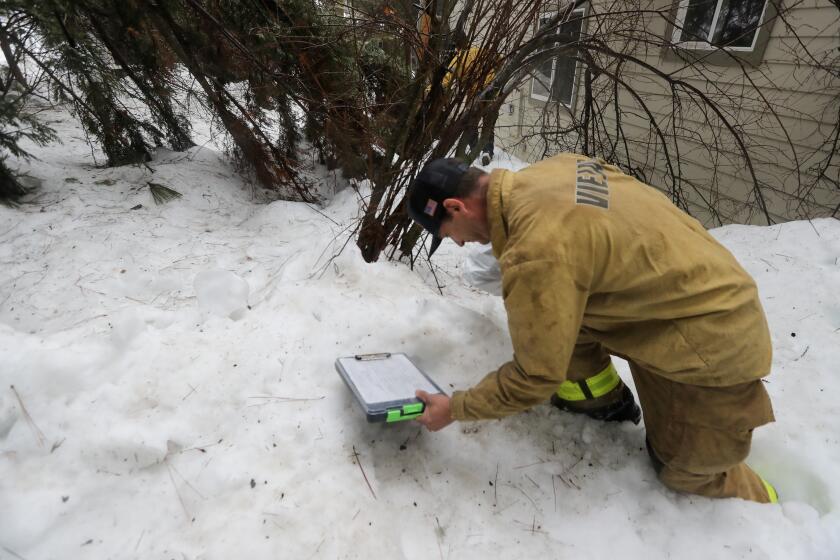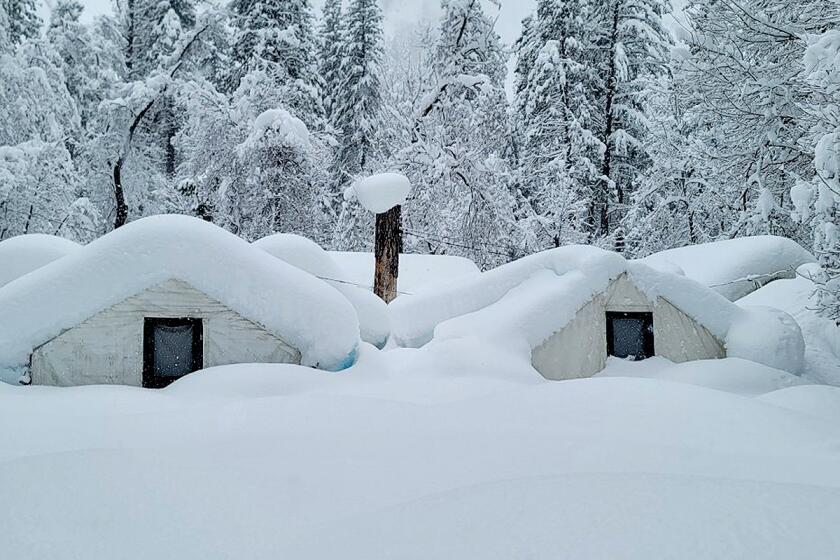Gas leaks, fires and collapsed roofs plague mountain towns after heavy snow
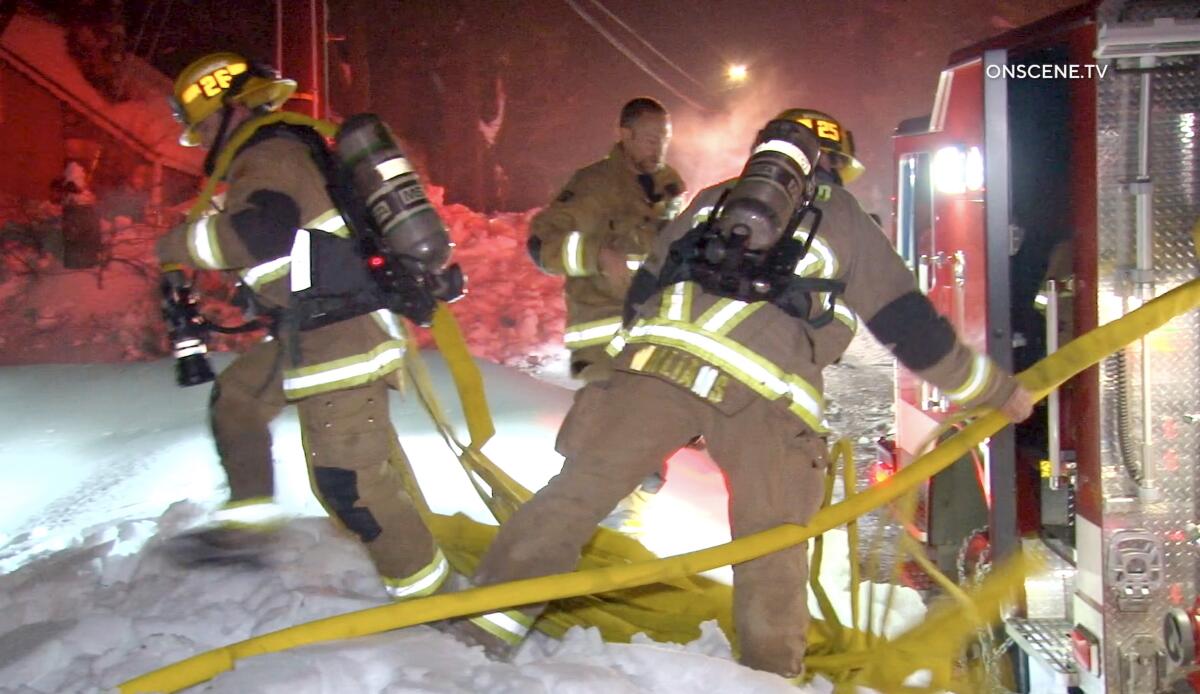
While residents in the San Bernardino Mountains try to dig out of their homes after back-to-back storms dumped a historic amount of snow, emergency officials are struggling to respond to house fires sparked by possible gas leaks.
There have been seven fire calls in the last week, which is not typical for emergency officials, said Battalion Chief Mike McClintock of the San Bernardino County Fire Department.
Mounds of snow still block the roads, so firefighters must use snowmobiles they typically deploy for backcountry rescues.
Crews have had to lug their equipment through the snow and dig to access fire hydrants, draining precious time to respond to the emergencies, according to the San Bernardino County Fire Department.
At least two people were injured in a house fire Wednesday afternoon in the community of Blue Jay, about a mile from Lake Arrowhead Village.
The cause of the fire is under investigation, and Southern California Gas Co. is working with emergency responders to address reports of gas leaks, McClintock said.
“There’s a lot of variables and a lot going on with 10 feet of snow dumped on our homes and communities,” he said. “We’re seeing structural instability, we’re seeing utility issues, downed power lines, trees into power lines, and we had more than 70 reports of gas leaks in the area.”
People in the Southern California mountains have been trapped in their homes for days by heavy snow after a series of winter storms.
The mountains have seen more structure fires than normal, San Bernardino County Fire Chief Dan Munsey said at a Friday morning news conference.
“We believe that these are due to natural gas leaks,” he said. “Over the last 48 hours, we’ve had five of these gas fires that our firefighters have to fight. I spoke to one of our incident commanders last night, and he said that he hadn’t slept in over four days.”
After multiple reported gas explosions, emergency officials are urging residents to clear the snow around their gas meters and hydrants.
Mike Lumpis and his fiancée, Ari Aguilera, were at their Lake Arrowhead home when the winter storms hit and buried their property and nearby roads in nearly 8 feet of snow, according to Lumpis’ brother-in-law Daniel Dressler.
On Tuesday, the couple realized there was a gas leak in their home and called SoCalGas but were told that the nearby roads were impassable and the utility couldn’t address the leak. They couldn’t get out of the house and spent that night in the living room because the smell was so potent in their bedroom.
The next day, Dressler called Aguilera and told them to pack their things and to get out of the house as soon as they could.
But then an hour later, Dressler learned that the house had exploded and was on fire. A few moments later, it collapsed. The couple were injured but survived.
“What seems to have happened is their gas meter was buried under 8 feet of snow,” Dressler said. “And when those gas meters get buried like that, there’s an air vent on the bottom of them, and if those get clogged, that can cause a back pressure and cause explosions and gas leaks.”
Lumpis and Aguilera were in the process of packing to leave the house when an explosion knocked Lumpis through the bedroom door. Lumpis sustained burns to his face and body and had a dislocated shoulder. He called out for Aguilera and realized she was trapped under their collapsed roof.
He managed to get her and their dog out of the house before it collapsed completely, but couldn’t save their cat in time.
Lumpis and Aguilera were discharged from the hospital Thursday night and are currently recovering from their injuries in a Redlands hotel room. Dressler was acting as a spokesperson for them because they were too injured to speak to the media.
The couple lost all of their belongings inside and didn’t have renter’s insurance. A GoFundMe page has been started on their behalf.
“One thing that they said is make sure when you’re talking about what happened to us, let them know this is also happening to so many other people,” Dressler said. “This isn’t an isolated situation. They want the word out there.”
In addition to the gas fires, homes and businesses have faltered under the weight of the heavy snowfall.
Goodwin & Son’s Market in Crestline was red-tagged after its roof collapsed. The family-owned business said there is still food, but it’s unsafe for anyone to go inside.
“We would love more than anything to give the food out but at this time are waiting for a structural engineer, and the adjuster who are heading up the mountain this morning to meet with us,” the store wrote in a Facebook post Thursday.
The snow-capped Sierra Nevada and the Santa Monica Mountains north of Malibu are among the areas of California no longer considered to be in drought.
Aerial footage from KNBC-TV Channel 4 showed most of the building collapsed under the snow, only its perimeter walls left standing. Crestline has received more than 8 feet of snow in the last week.
San Bernardino County Supervisor Dawn Rowe surveyed the damage at Goodwin’s with fire officials Thursday.
“We are working hand-in-hand with the owners to rebuild as quickly as possible,” Rowe wrote in a statement on social media. “The Unified Command is working on a location to stage food and supplies for residents as quickly as possible.”
Katie Mead, 43, considers herself one of the “lucky” ones in Lake Arrowhead — her street has been plowed at least once, and she has gotten less snow than some neighbors because she lives on the “sunny side” of the lake, she said.
During a break in the weather Sunday, she brought groceries to a family staying in her Airbnb property, dug them out of the snow and drove them to a plowed main road so they could get home. Before another wave of storms hit Monday night, Mead also picked up a neighbor who had been walking miles in the snow to get groceries.
Her street was plowed Sunday night, but since then about 3 feet of snow has accumulated.
California’s deadly storm season continued Friday as the first of two atmospheric river storms descended on the state, prompting evacuation orders.
“It does feel like they didn’t start soon enough,” she said. “They waited for the snow to accumulate to the point where our normal plows can’t deal with it [and] we have to wait for heavy equipment to come. They literally have to move snow shovel-load by shovel-load and dump it somewhere else. There’s so much snow.”
Mead was one of many residents who tuned in to a livestreamed town hall hosted by Rowe on Thursday afternoon. County officials assured residents that they’ve been working with nonprofits to create distribution points in communities where food and other supplies have been running low, noting that some grocery store parking lots in Big Bear and surrounding areas had been cleared of snow.
Mead, however, pointed out in the comments of the video that some people aren’t able to get to those distribution points.
“How is an elderly person supposed to walk even a block to a distribution center in 4 feet of snow?” she commented.
After recent winter storms dumped up to 15 feet of snow on Yosemite National Park in some areas, it has been closed with no estimated time of reopening.
“Our main issue is that they’re bringing in National Guard and bringing supplies up the mountain, but we’re all snowed in,” she said in an interview. “Unless you happen to be close to the area where they’re doing distribution, it’s kind of irrelevant.”
Members of the California Guard’s Joint Task Force Rattlesnake, who typically work with wildland firefighting crews, were dispatched to Lake Arrowhead this week after Gov. Gavin Newsom declared a state of emergency for San Bernardino and 12 other counties.
In the last week, the San Bernardino Mountains received an “unprecedented and historic” amount of snowfall, said meteorologist Samantha Connelly with the National Weather Service office in San Diego.
Running Springs received 12 feet of snow, Big Bear Lake received 11 feet and Lake Arrowhead saw a little over 9 feet, according to the latest readings.
More to Read
Sign up for Essential California
The most important California stories and recommendations in your inbox every morning.
You may occasionally receive promotional content from the Los Angeles Times.
